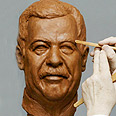
It was in 1982, when very few foreign journalists were present in Iraq and the world's eyes were turned toward the threat coming from Iran, Iraq's neighbor and bitter rival.
Also, in Iraq only few knew about the attempt to assassinate Saddam, which led to the execution of approximately 150 of the residents of Dujail, a small town north of Baghdad that served as the resistance center to the tyrant's rule.
Only after Saddam was captured, about two years ago, those who survived the series of murders dared to open their mouths and tell about the events of those days.
In those days, Dujail served as the sanctuary of the Daawa party, a Shiite party that opposed to Saddam's Sunni-secular regime. The party members mainly objected to Saddam's war against Shiite Iran, their religious-spiritual ally.
On July 8, 1982 Saddam arrived at a meeting in Dujail. While he was driving the town's streets, a member of the Daawa party opened fire toward him. Saddam was not hurt, and the assassination attempt was followed by a heated shooting fight, which lasted a few hours.
As a punishment for the assassination attempt, Saddam's secret police officers raided the town. They captured the residents, cut down the orchards, demolished the houses and conducted field trials.
Eventually, 150 people were executed, some of them 13-year-old youths. The rest of the town's residents were banished by the police to camps set up in the desert.
Town erased from the map
The Economist was one of the only media to report what happened in the town. In an article written on July 31 of that year, the magazine reported that an assassination attempt took place in Dujail and was thwarted by the army.
Four months later, the magazine referred to the events once more, reporting that the town had been totally erased from the map.
For a long time, the Iraqi government did not acknowledge what had happened in Dujail. Only about two years later, Saddam's half brother and the intelligence commander, Ibrahim al-Tikriti, reported the assassination attempt in a book he wrote. The events that followed the failed attempt, including the massacre of the town's residents, was not mentioned in the book by even one word.
The neighboring Arab countries all stood behind Saddam, mainly because of his war against Iran. In Egypt, for example, in which there is a lot of media, the massacre was hardly reported.
Eat him alive
Many of the international observers responsible for the trial's proper proceedings are wondering whether it is right to open with the Dujail massacre of all things, as Saddam is being accused of much more severe crimes, such as the murder of 5,000 Kurds by chemical weapons in 1998 and the murder of thousands of Shiites in the south of the country after a failed uprising attempt in 1991.
The sad truth is that the court chose to focus on Dujail simply because the massacre of hundreds, compared to that of thousands, is easier to document.
The town's survivors are not interested in the reason. Most of them would like to see Saddam being hung.
Salima Majid al-Khadri, 60, told the Boston Globe that the town's residents want to eat Saddam while he is still alive. Al-Khadri spent four years of her life in the camp to which she was deported after the town's uprising. Only 17 years later, after Saddam's fall, she discovered that her husband and two sons, who were detained by the police and taken to Baghdad, were brutally murdered.
Al-Khadri has no doubt what the judges should do with Saddam. She says she hopes they will decide to cut him into little pieces and give them to families like her own.
Her daughter, Tikra Abbas, was only 15 years of age when she was sent to the desert camp with her mother. She says that when she sees Saddam on television with his suit and shoes she wants to break the television set.
Al-Khadri neighbor, Kadim Daham al-Salami, thinks the same. He says that Saddam's execution would represent the victory of good over evil, the victory of justice over distortion. Al-Salami lost his father and two of his brothers in the massacre.
Did the West know?
Another question which will be raised in the trial will be the extent of involvement of western countries, which kept silent in light of the massacre.
The U.S. and its allies preferred to turn a blind eye and use Saddam's "services" against Iran, which became a bitter rival in 1979, under Khomeini's regime. The Americans even claimed that the Shiite Daawa people were agents of the Iranian intelligence, and accused them of bombing the U.S. Embassy in Kuwait a year after the Dujail massacre.
Today it is known that the U.S. was well aware of Saddam's use of chemical weapons during the Iran-Iraq war. But did the Americans know about what happened in Dujail? This question has no clear answer.
Washington's critics say that even if the government was not familiar with the exact details of the massacre, it did assist in creating an international environment that facilitated Saddam in committing his crimes.
Mamdouh al-Sheikh, an Egyptian writer who studied the attitude of the western media toward Saddam's regime, declared that the Western countries not only knew about the acts of the Iraqi tyrant, but also approved them and took part in them.















